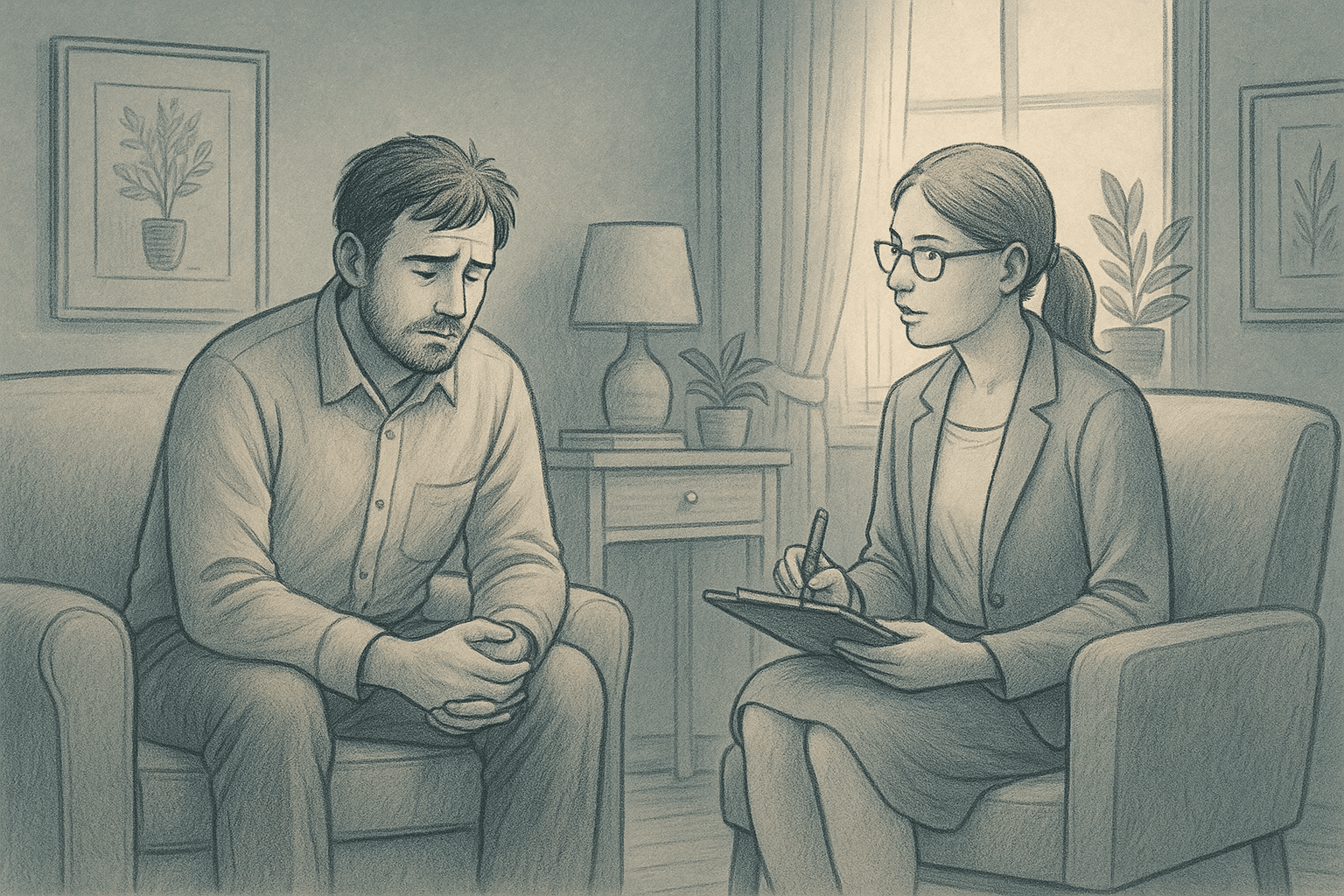Key Takeaways
- Auditory hallucinations are a common symptom of schizophrenia, affecting up to 80% of those diagnosed.
- These voices can be managed with antipsychotic medications, therapy, and coping strategies.
- Understanding the nature of these voices can help in setting boundaries and reducing their influence.
- Professional mental health assistance is essential for effective management and treatment.
- A Mission for Michael (AMFM) offers specialized schizophrenia treatment programs with multidisciplinary teams providing evidence-based approaches like CBT, medication management, creative therapies, and both inpatient and outpatient options customized to the severity of auditory hallucinations.
Understanding Hearing Voices
Auditory hallucinations, or hearing voices, are a hallmark symptom of schizophrenia. These voices can be distressing, often disrupting daily life and causing significant emotional turmoil. But with the right knowledge and strategies, it’s possible to manage these experiences effectively.
What Are Auditory Hallucinations?
Auditory hallucinations involve hearing sounds, often voices, that aren’t present in the environment. They can range from whispers to shouts and may be perceived as coming from inside or outside one’s head. These voices might issue commands, make commentary, or engage in conversations.
For example, one might hear a voice that says, “You’re doing great,” while another might hear, “You’ll never succeed.” The nature of these voices can vary greatly from person to person.
Prevalence in Schizophrenia
Auditory hallucinations are not uncommon among those diagnosed with schizophrenia. In fact, studies suggest that more than 70% of individuals with schizophrenia experience these voices at some point in their lives. This prevalence highlights the importance of addressing and managing this symptom effectively.
Impact on Daily Life
The impact of hearing voices can be profound. These hallucinations can interfere with concentration, make it difficult to engage in conversations, and even affect one’s ability to complete everyday tasks. The distress caused by negative or threatening voices can lead to anxiety, depression, and social withdrawal.
Founded in 2010, A Mission For Michael (AMFM) offers specialized mental health care across California, Minnesota, and Virginia. Our accredited facilities provide residential and outpatient programs, utilizing evidence-based therapies such as CBT, DBT, and EMDR.
Our dedicated team of licensed professionals ensures every client receives the best care possible, supported by accreditation from The Joint Commission. We are committed to safety and personalized treatment plans.
Treatment Approaches
Antipsychotic Medications

Antipsychotic medications are often the first line of treatment for auditory hallucinations in schizophrenia.
Antipsychotic medications work by altering the effects of neurotransmitters in the brain, helping to reduce or eliminate the voices.
It’s recommended that you work closely with a healthcare provider to find the right medication and dosage. This process might take time, but it’s crucial for achieving the best results. Besides that, adhering to the prescribed medication regimen is vital for maintaining stability and preventing relapse.
Cognitive Behavioral Therapy
Cognitive Behavioral Therapy (CBT) is a structured therapeutic approach that helps individuals understand and change their relationship with auditory hallucinations. This evidence-based therapy focuses on identifying unhelpful thought patterns and developing healthier responses to the voices.
During CBT sessions, therapists work with patients to recognize triggers for hallucinations and develop coping strategies. These might include challenging the content of the voices, setting boundaries with them, or using distraction techniques. Regular practice of these skills is essential, and many people benefit from ongoing therapy sessions to reinforce new patterns of thinking.
Repetitive Transcranial Magnetic Stimulation
Repetitive Transcranial Magnetic Stimulation (rTMS) is an innovative treatment that uses magnetic fields to stimulate nerve cells in the brain. It’s particularly useful for individuals who haven’t responded well to medication alone. The procedure is non-invasive and generally well-tolerated, making it an attractive option for many.
rTMS involves placing an electromagnetic coil against the scalp, which then delivers a magnetic pulse to the brain. This process can help reduce the frequency and intensity of auditory hallucinations. While not a cure, it can be a valuable part of a comprehensive treatment plan. Patients often report a decrease in the severity of the voices they hear, leading to improved daily functioning and quality of life.
Coping Strategies for Auditory Hallucinations
Stress Reduction Techniques

Stress often exacerbates symptoms of schizophrenia, including auditory hallucinations. Therefore, engaging in stress reduction techniques can be incredibly beneficial.
Practices such as mindfulness meditation, yoga, and deep-breathing exercises can help calm the mind and body, reducing the intensity of the voices.
Engaging in regular physical activity is another effective way to manage stress. Exercise releases endorphins, which are natural mood lifters. Whether it’s a brisk walk, a swim, or a dance class, finding an enjoyable form of exercise can make a significant difference.
Setting Boundaries with Voices
Learning to set boundaries with the voices can help individuals regain a sense of control. This might involve acknowledging the voices but choosing not to engage with them. While the voices may be present, they don’t have to dictate actions or emotions.
For instance, one might say internally, “I hear you, but I’m choosing not to listen right now.” This mental boundary-setting can reduce the power the voices hold, making them easier to manage.
Selective Listening Techniques
Selective listening involves focusing on specific sounds or activities to drown out the voices. This might include listening to music, engaging in a hobby, or even having a conversation with someone. The goal is to shift attention away from the hallucinations and onto something more positive or engaging.
For example, wearing headphones and listening to your favorite playlist can help distract from the voices. Similarly, reading aloud or singing can also serve as effective distractions, providing a sense of relief and control.
Support Systems for Individuals Hearing Voices
Role of Family and Friends
Educating loved ones about schizophrenia and its symptoms can foster empathy and better communication.
Family members need to practice active listening and avoid judgment. This creates a supportive environment where individuals feel safe to share their experiences without fear of stigma or misunderstanding.
Support Groups and Community Resources
Support groups offer a unique opportunity for individuals to connect with others facing similar challenges. These groups provide a platform to share experiences, offer advice, and receive support from peers.
Community resources, such as mental health clinics and organizations, can offer additional support and services. These might include therapy sessions, educational workshops, and crisis intervention services. Accessing these resources can enhance one’s ability to manage schizophrenia and improve overall well-being.
Professional Mental Health Assistance

Seeking professional mental health assistance is crucial for anyone dealing with schizophrenia and auditory hallucinations.
Mental health professionals, including psychiatrists, psychologists, and therapists, are equipped to offer the guidance and treatment necessary for managing these symptoms.
Psychiatrists can prescribe and monitor medications, ensuring that the treatment plan is designed for each individual’s needs. Psychologists and therapists can provide CBT and other therapeutic interventions that help individuals develop coping strategies and address the emotional impact of hearing voices.
AMFM’s Compassionate Approach to Managing Voices
Managing hearing voices in schizophrenia requires specialized care that addresses both the neurological basis of auditory hallucinations and their emotional impact. At AMFM, we understand that these voices can be overwhelming, but they can be managed effectively with the right treatment approach.
Our comprehensive schizophrenia treatment centers in California, Virginia, and Washington offer evidence-based interventions specifically designed to help you regain control. Our multidisciplinary team provides expert medication management to reduce the frequency and intensity of voices, while our specialized CBT approaches help you develop healthier relationships with these experiences.

AMFM provides comprehensive schizophrenia treatment so you can get the help and support you need.
What sets AMFM apart is that we don’t just manage your symptoms. Instead, we offer creative therapies like art and music therapy that provide alternative avenues for expression, especially valuable when voices make verbal communication challenging. Our supportive community environment helps counter the isolation that often accompanies auditory hallucinations.
If you need intensive residential care during acute periods or flexible outpatient support for ongoing management, we create our approach to your unique needs. Don’t let hearing voices control your life. Contact AMFM today at 866-478-4383 for a confidential assessment and take the first step toward reclaiming your well-being.
Frequently Asked Questions ( FAQ)
Why do people with schizophrenia hear voices?
Auditory hallucinations in schizophrenia are thought to result from disruptions in brain function, particularly in areas involved in processing sound and language. These disruptions can cause the brain to interpret internal thoughts or sounds as external voices.
How can therapy help with hearing voices?
Therapy, particularly cognitive behavioral therapy (CBT), can be highly effective in managing auditory hallucinations. CBT helps individuals identify and challenge negative thought patterns, develop coping strategies, and improve emotional regulation.
Are there lifestyle changes that can reduce auditory hallucinations?
Lifestyle changes can complement medical and therapeutic interventions in managing auditory hallucinations. Prioritizing sleep, maintaining a balanced diet, and engaging in regular physical activity can all contribute to improved mental health.
What role do support groups play in managing schizophrenia?
Support groups offer a sense of community and shared experience, which can be invaluable for individuals managing schizophrenia. These groups provide a platform to share stories, offer advice, and receive support from peers who understand the challenges firsthand.
How can AMFM help with managing schizophrenia and hearing voices?
AMFM offers comprehensive schizophrenia treatment with programs specifically designed to address auditory hallucinations. Our multidisciplinary approach includes medication management by experienced psychiatrists, evidence-based therapies like Cognitive Behavioral Therapy, and specialized interventions such as art therapy and social skills training.
We also provide multiple levels of care, from intensive residential programs for severe symptoms to outpatient options for ongoing management.












